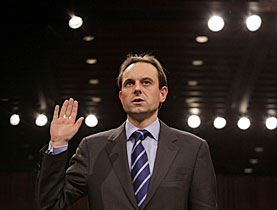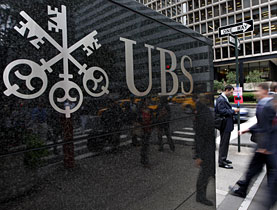Swiss keen to decouple secrecy and tax evasion

Finance Minister Hans-Rudolf Merz has issued the strongest hint yet that Switzerland might change its view on tax evasion in order to preserve banking secrecy.
Merz’s comments come a day after a United States Senate hearing said it would continue to pile pressure on UBS, Switzerland’s biggest bank, to disclose confidential client data despite some information already being handed over.
Speaking to reporters in Geneva, Merz said his taskforce was looking into ways of revising the Swiss law that treats tax evasion as a civil offence rather than a crime.
“The cabinet is currently considering the distinction between tax evasion and tax fraud,” he said. “Our experts are working on a strategy on how to develop banking secrecy and not dismantle it.”
Pressure on Switzerland and other tax havens is building from the US and Europe. UBS has been in the firing line and was forced to pay $780 million (SFr915 million) in fines to the US authorities and hand over details of some clients during a tax evasion probe.
Separation
But the US Internal Revenue Service (IRS) is demanding more information be handed over, while the Senate reiterated its determination to widen the scope of its investigation.
“Even if the IRS wins its case against UBS, the battle against tax havens will not be over,” said Senator Carl Levin at a hearing on Wednesday.
Nuno Fernandes, professor of finance at the IMD business school in Lausanne, is certain that the issue of tax evasion will have to be settled to allow Switzerland’s battered banking system to get back on track.
But he stressed that secrecy is not all about tax evasion and that the pressure on UBS and Switzerland is only one part of a bigger picture.
“The similarities between secrecy and tax evasion have been magnified, and this is confusing people, but they are not related at all,” he told swissinfo. “This is much more global than UBS or Switzerland. This is a fight by governments around the world against tax havens.”
Fernandes advised the Swiss to buy enough time to get its house in order.
Onshore strategy change
“What Switzerland can do is to negotiate some transition period that would allow its banks to change strategies and change revenue activities because it is very difficult to do in a few months in the middle of the financial crisis,” he said.
Earlier this week UBS signalled its intent to sort out the issue by nominating former finance minister Kaspar Villiger as its new chairman. Villiger handled such sensitive issues as Holocaust bank accounts and European Union tax treaties during his ministerial reign.
UBS and other Swiss banks have also been remodelling their strategies in recent months by setting up more onshore activities in the Middle East, Asia and Europe. The move is widely believed to signal a shift away from traditional offshore activities.
“Onshore will be more important than offshore in future. Offshore will still exist but the biggest chunk of money invested into banking will be in onshore facilities,” Fernandes said.
swissinfo, Matthew Allen
People wishing to dodge paying taxes on their assets can do so by three means: avoidance, evasion and fraud.
Avoidance is the legitimate means of structuring finances so they don’t fall under the scope of taxable assets. This can be done, for example, by setting up a trust fund or by changing country residence or nationality.
Evasion is the deliberate concealing the true state of assets from the tax authorities – in other words, lying about the extent of your assets. This is a civil offence in Switzerland and some other countries, such as Austria and Liechtenstein, but criminal in most states.
The main distinction between evasion and fraud is that the perpetrator tells lies on official documentation. Unless tax fraud can be proved, Swiss banks are not obliged to hand over details of client assets to investigators. In some cases this information is needed before fraud can be established in the first place.

In compliance with the JTI standards
More: SWI swissinfo.ch certified by the Journalism Trust Initiative




You can find an overview of ongoing debates with our journalists here. Please join us!
If you want to start a conversation about a topic raised in this article or want to report factual errors, email us at english@swissinfo.ch.